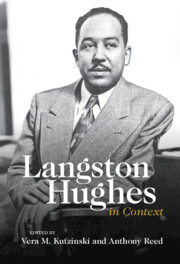Book contents
- Langston Hughes in Context
- Langston Hughes in Context
- Copyright page
- Contents
- Contributors
- Abbreviations
- Introduction
- Part I Singing America
- Part II The Global Langston Hughes
- Chapter 12 Langston Hughes and the Haitian Revolution
- Chapter 13 Taking Louise Bennett Seriously
- Chapter 14 Langston Hughes and Mexico
- Chapter 15 Langston Hughes in Spain
- Chapter 16 Langston Hughes in Cuba and South America
- Chapter 17 Langston Hughes, Colonialism, and Decolonization
- Chapter 18 Langston Hughes and Cultural Diplomacy
- Chapter 19 Langston Hughes in the Soviet Union
- Chapter 20 Translating Blackness
- Chapter 21 Langston Hughes and the Shanghai Jazz Scene
- Chapter 22 Langston Hughes’s Short Fiction in 1930s Korea
- Part III Afterlives
- Index
Chapter 17 - Langston Hughes, Colonialism, and Decolonization
from Part II - The Global Langston Hughes
Published online by Cambridge University Press: 10 November 2022
- Langston Hughes in Context
- Langston Hughes in Context
- Copyright page
- Contents
- Contributors
- Abbreviations
- Introduction
- Part I Singing America
- Part II The Global Langston Hughes
- Chapter 12 Langston Hughes and the Haitian Revolution
- Chapter 13 Taking Louise Bennett Seriously
- Chapter 14 Langston Hughes and Mexico
- Chapter 15 Langston Hughes in Spain
- Chapter 16 Langston Hughes in Cuba and South America
- Chapter 17 Langston Hughes, Colonialism, and Decolonization
- Chapter 18 Langston Hughes and Cultural Diplomacy
- Chapter 19 Langston Hughes in the Soviet Union
- Chapter 20 Translating Blackness
- Chapter 21 Langston Hughes and the Shanghai Jazz Scene
- Chapter 22 Langston Hughes’s Short Fiction in 1930s Korea
- Part III Afterlives
- Index
Summary
From his earliest writings, Langston Hughes expressed outrage at the predations of colonialism. These sentiments were reaffirmed in his early travels to Africa, Asia, and the Caribbean, mostly to countries dominated by the European and US empires. Overt opposition to colonialism thus became fundamental to Hughes’s political and writerly praxis; moreover, it informed and motivated not only his representations of Africa but also his thinking about race, the Black diaspora, the United States, and the modern world. His recognition of colonialism as a system predicated on white supremacy helped him to see US racism and Jim Crow as local manifestations of that global system, which in turn motivated him to cultivate channels of solidarity and support with peoples around the world. Hughes used his writing to champion anticolonial resistance wherever he found it and, by highlighting its successes abroad, to inspire new oppositional movements at home in the United States.
- Type
- Chapter
- Information
- Langston Hughes in Context , pp. 182 - 191Publisher: Cambridge University PressPrint publication year: 2022

